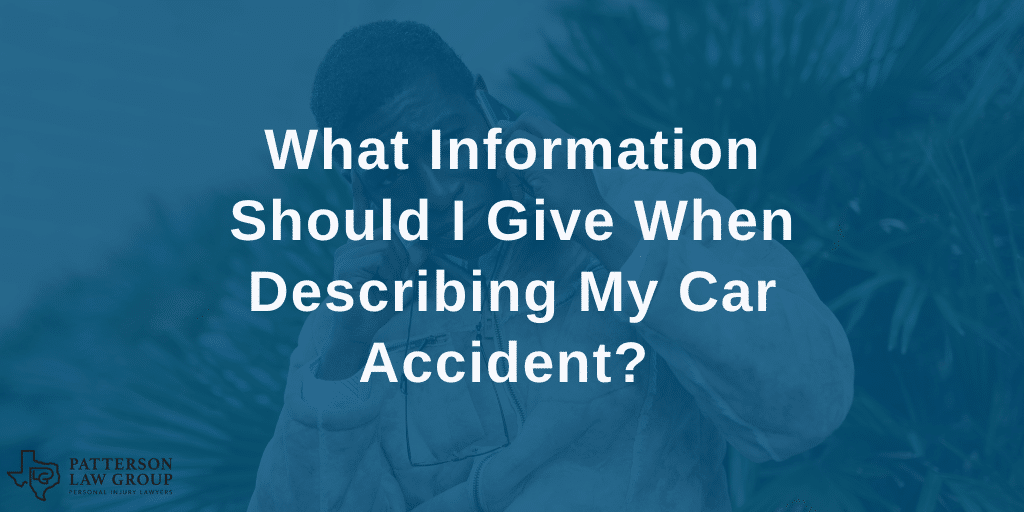You should always tell the truth when explaining what happened to you in a car accident. However, there are some guidelines that will help you if a debate arises about who was at fault in the car crash.
Car accidents are common, but most of us don’t go through many in our lifetime. When we are suddenly involved in one, it’s easy to get confused and frightened, unsure what to do next.
But you don’t have to go through an accident without help. Read through this article to discover what you should say and not say after a car accident.
Who Should I Talk To After My Car Accident?
The first person you should talk to after an accident is a medical professional if you can. Always start by calling an ambulance to make sure you and everyone else in the accident are okay.
After talking to the medical providers, there are a few other people you need to talk to.
- You want to call a police officer to get an official record of what happened in the accident. While you may not want to deal with the police, it will be beneficial to have their report when determining fault in a crash.
- Talk to the other driver(s) involved in the crash. You will likely need their insurance information and contact information.
- Talk to any witnesses at the scene. Witness evidence is invaluable in cases where the fault is disputed. Try to get statements and contact information from anyone who saw what happened.
- Talk to your insurance company. Regardless of who was at fault, you’ll still need to file a claim with your insurance company. Insurance adjusters from your company will do some research to determine who was at fault in the accident and what damages need to be paid.
- Don’t talk to the other insurance company if you can avoid it. Insurance companies who don’t want to pay for damages may try to twist your words or get you to admit fault so they can blame the accident on you. Be very careful about discussing the accident with another insurance company.
What Not to Say to the Insurance Companies
Don’t tell the insurance companies too much. All they need to know is exactly what happened in the accident.
If you start talking too much, you may let slip some information you didn’t intend that they can quickly turn back around and use against you.
Here are some basic guidelines when talking to an insurance company after an accident:
- Never admit fault. Rarely, a crash is entirely the fault of one person. However, Texas is a modified comparative negligence state. Modified comparative negligence means that if you were 51% or more responsible for the accident, you wouldn’t be able to recover any compensation. However, if you were less than 50% responsible, you can recover from the other party. In dealing with insurance companies, it’s best not to claim any amount of fault before speaking with a legal representative. Avoid sounding apologetic or saying you’re sorry–just state the facts of the accident and move on.
- Never discuss your injuries. If you tell an insurance company you’re okay or barely hurt, they will use that against you when it comes time to determine your deserved compensation. Talk to a medical professional. Get records to prove how serious of an injury your accident may have caused.
- Never tell the insurance company that you don’t have a lawyer. Working with no legal representation can cause insurance companies to push you into doing things that may be unwise. Always call a personal injury lawyer. Our personal injury attorneys at Patterson Law Group can help you before you discuss your case in-depth with an insurance company.
- Never sign a release. Your insurance company may ask you to sign a release so they can access your medical records or provide you a car. However, this releases them to access any information about you that they want.
- Never accept a settlement without talking to a lawyer first. If you accept the first offer made, you likely won’t be getting what you deserve from your accident. Make sure to discuss your options with an attorney before making any decisions.

How Should I Describe My Car Accident?
Describe your accident in the plainest language possible. Don’t embellish–describe what happened.
After a crash, you will have to provide a statement to the police and your insurance company. As we discussed above, avoid any apologies or claims that you feel okay. Stick to the facts of what happened.
If possible, write your statement down as soon as you can. Simply record what happened from step one, avoiding any mention of how you felt. Keep the details clear and concise.
Record where you were, what you were doing, and what you saw. Record what the other driver did or did not do. Write down any notable details, such as brake lights that weren’t working or any erratic movements of the other driver.
Never lie when describing your car accident. While it might be tempting to avoid blame, any lies that are discovered can and will be used against you. Remain as truthful as possible and repeat the facts as they happened.
What Should I Do if the Other Party’s Insurer Requests a Recorded Statement?
After a collision, an experienced lawyer will always instruct you not to agree to a recorded statement to the other party’s insurance company. The insurer might tell you that your recorded statement is just for information or that you will not be under oath. Regardless, even an innocent comment such as “I’m feeling better” or “I feel bad for the driver that hit me” can be used against you and reduce the damages award you can recover as your negligence lawsuit moves forward.
After every accident in Dallas Forth Worth or anywhere else in Texas, your best strategy will always be to retain the services of a car accident attorney. They will have experience negotiating with liability insurers and know how to protect you against their attempts to reduce or limit the compensation you are entitled to receive. As soon as you are represented by an attorney, the insurer will be precluded from contacting you directly. All communications and requests for statements or other information will then be made through your lawyer.
As your Texas car accident lawsuit moves through the courts, the insurer’s lawyers will likely ask to take your deposition, a formal recorded question-and-answer session you will attend with your lawyer. If the insurer attempts to get you to admit fault or liability in that deposition, your lawyer will object to or stop the proceedings. They will do this to protect your right to recover the largest available damages award for your injuries and losses.
Keep in mind that insurers in Texas and their lawyers handle thousands of car accident cases every year and have extensive experience in defending against claims for damages. You will be at a substantial disadvantage when you try to respond to insurance company requests without the assistance of a seasoned Texas personal injury lawyer. You can best level the playing field and place yourself on equal footing with insurers and their attorneys when you retain your own legal counsel to protect your interests.
Will a Personal Injury Attorney Talk to the Insurance Company for Me?
Instead of dealing with the insurance company yourself, hire a personal injury attorney to negotiate with the insurance companies on your behalf. An expert Texas personal injury attorney knows how to negotiate and deal with the insurance companies.
In most cases, it’s best to talk to a personal injury lawyer before making any recorded statements to insurance companies.
Once the insurance adjusters have started working on the claims, personal injury lawyers can give them the details of what occurred in your accident without revealing any unnecessary information.
If you’ve been in a car accident and just aren’t sure about how to deal with insurance companies, reach out to our top-rated attorneys at Patterson Law Group. We have over 80 years of experience dealing with insurance companies to get the best results for our clients.
Don’t go through the hassle of talking to an insurance company alone. Call Patterson Law Group today!






